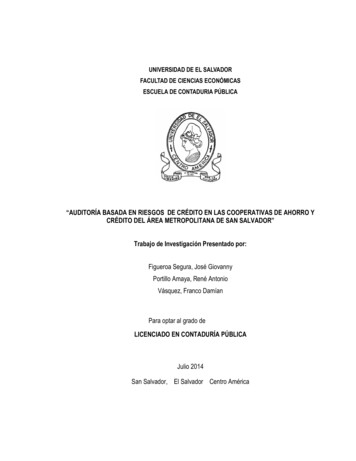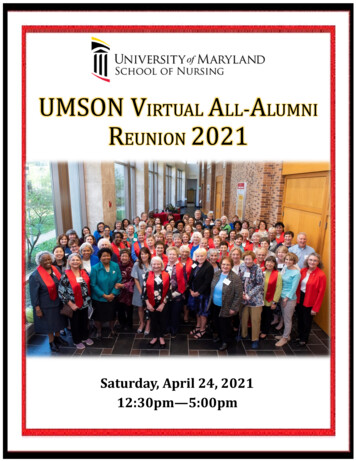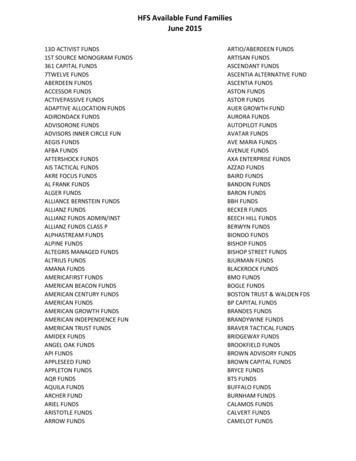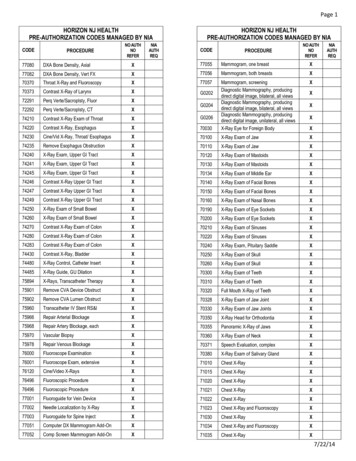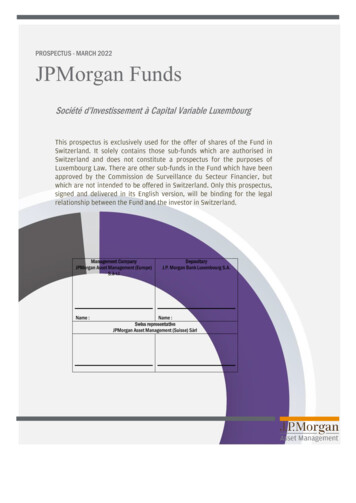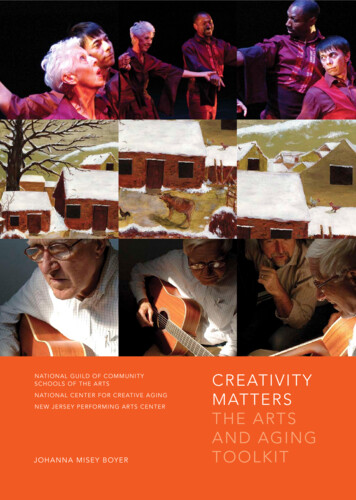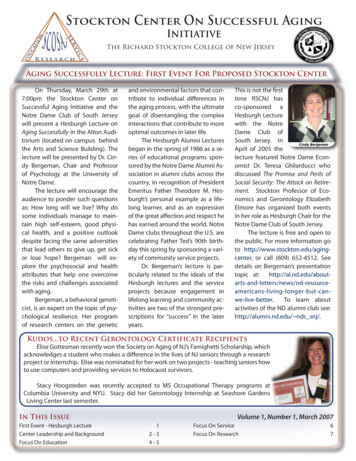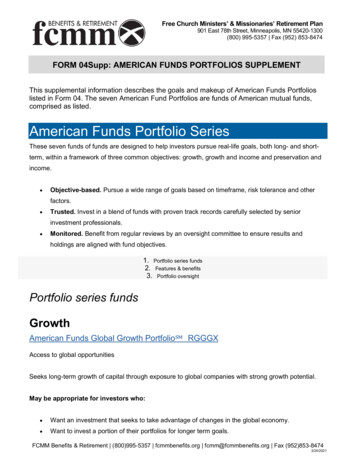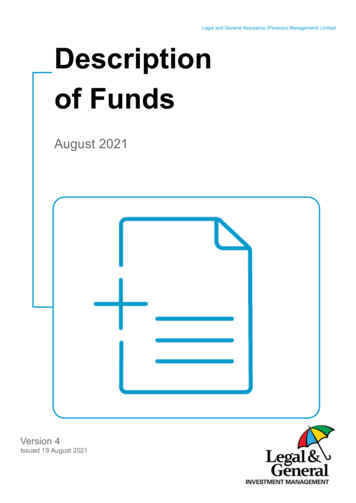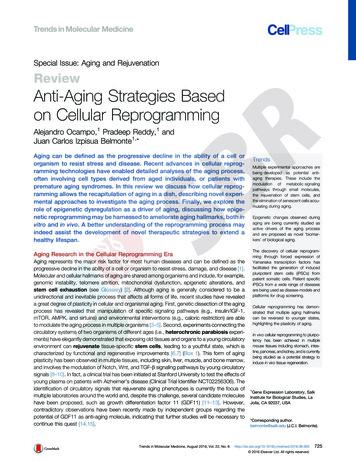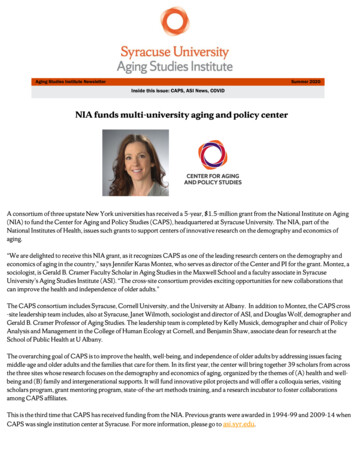
Transcription
Aging Studies Institute NewsletterSummer 2020Inside this issue: CAPS, ASI News, COVIDNIA funds multi-university aging and policy centerA consortium of three upstate New York universities has received a 5-year, 1.5-million grant from the National Institute on Aging(NIA) to fund the Center for Aging and Policy Studies (CAPS), headquartered at Syracuse University. The NIA, part of theNational Institutes of Health, issues such grants to support centers of innovative research on the demography and economics ofaging.“We are delighted to receive this NIA grant, as it recognizes CAPS as one of the leading research centers on the demography andeconomics of aging in the country,” says Jennifer Karas Montez, who serves as director of the Center and PI for the grant. Montez, asociologist, is Gerald B. Cramer Faculty Scholar in Aging Studies in the Maxwell School and a faculty associate in SyracuseUniversity’s Aging Studies Institute (ASI). “The cross-site consortium provides exciting opportunities for new collaborations thatcan improve the health and independence of older adults.”The CAPS consortium includes Syracuse, Cornell University, and the University at Albany. In addition to Montez, the CAPS cross-site leadership team includes, also at Syracuse, Janet Wilmoth, sociologist and director of ASI, and Douglas Wolf, demographer andGerald B. Cramer Professor of Aging Studies. The leadership team is completed by Kelly Musick, demographer and chair of PolicyAnalysis and Management in the College of Human Ecology at Cornell, and Benjamin Shaw, associate dean for research at theSchool of Public Health at U Albany.The overarching goal of CAPS is to improve the health, well-being, and independence of older adults by addressing issues facingmiddle-age and older adults and the families that care for them. In its first year, the center will bring together 39 scholars from acrossthe three sites whose research focuses on the demography and economics of aging, organized by the themes of (A) health and wellbeing and (B) family and intergenerational supports. It will fund innovative pilot projects and will offer a colloquia series, visitingscholars program, grant mentoring program, state-of-the-art methods training, and a research incubator to foster collaborationsamong CAPS affiliates.This is the third time that CAPS has received funding from the NIA. Previous grants were awarded in 1994-99 and 2009-14 whenCAPS was single institution center at Syracuse. For more information, please go to asi.syr.edu.
ASI NEWSLandes, London, and Wilmoth co-author paper on health care for aging veteransGerontological Society of America’s Public Policy & Aging Report, published the article “A Population-BasedPerspective on Health Care for U.S. Veterans,” co-authored by Janet Wilmoth, Andrew London, and ScottLandes. The article provides a “framework that encourages consideration of the shifting needs of the fullpopulation of veterans as they age through mid-life into later life.” Maxwell.syr.eduSociology PhD student Claire Pendergrast article published in Ageing & SocietyCongratulations to Claire Pendergrast whose article, “Examining the role of ageing-inplace organizations in building older adults’ disaster resilience,” was published in Ageing &Society.Read the article: il Silverstein elected as Chair-Elect of ASA’s Section on Aging and the LifeCourseMerril Silverstein has been elected Chair-Elect of ASA’s Section on Aging and the Life Course(SALC). His appointment will begin August n-results
COVID SCHOLARSHIPMadonna Harrington Meyer was quoted in two articles that received widemedia pick upMadonna Harrington Meyer was quoted in two articles that nearly 70 media outlets picked up. The NPRarticle, “Too little or too much time with the kids? Grandparenting is tough in a Pandemic.” and The KaiserHealth News article, “We miss them all so much: Grandparents ache as the COVID exile grinds on.”Madonna Harrington Meyer quoted in New York Times article, “ For Grandparents, Filling in forChildcare can be ‘Wonderful and Exhausting’As the coronavirus pandemic stretches on and child care centers remain closed, many grandparents are split into two groups: thosewho are quarantined from their families and those who are isolating beside them, according to Madonna Harrington Meyer, asociology professor at Syracuse University and author of “Grandmothers at Work.” Those providing child care can see tremendousbenefits—more physical activity, a healthy emotional life, more socializing—but the additional stressors can also lead to burnout. “It’ssimultaneously wonderful and too much,” Meyer said.Read full article here.Harrington Meyer quoted in Christian Science Monitor article on working parents, COVID-19"A lot more grandparents are deciding to burst their bubble," to see or care for their grandchildren, says Madonna HarringtonMeyer, University Professor of Sociology and expert on intensive grandparenting. She was quoted in the Christian ScienceMonitor article "'I can’t keep this up much longer': Parents struggle with pandemic strain." Maxwell.syr.eduScott Landes talks to NPR and Spectrum News about COVID-19, people withdisabilitiesScott Landes, says COVID-19 death rates are higher among people with intellectual and developmentaldisabilities (IDD) compared to those without. He says it’s mainly individuals with pre-existing healthconditions. “This population, in general, either because of swallowing problems or disorders, or chokingdisorders, or just more susceptibility to lung infections seems to develop pneumonia at a higher rate thanthose in the general population,” he says. “That’s just really detrimental when you’re talking aboutsomething like COVID-19.” Landes was interviewed for the Spectrum News segment “COVID-19Death Rates Higher Among Those with Developmental Disabilities.”NPR Interview: COVID-19 Infections And Deaths Are Higher Among Those With IntellectualDisabilitiesToday Show: -pandemic-85224517928
COVID SCHOLARSHIPCollege of Law, Associate Professor Doron Dorfman wrote an Op Ed on COVID-19impact on FDA Policy for Gay blood donorsOptimism among public health scholars is rare in the era of coronavirus. Yet I suggest that the crisis mightpresent an opportunity to overrule one controversial health law policy that predates the pandemic: TheU.S. Food and Drug Administration’s blood donation ban on gay and bisexual men.The blood ban was developed out of necessity in response to the 1980’s HIV-AIDS outbreak and hassince undergone some amendments. The recent iteration of the ban forbids blood banks from acceptingdonations from men who have had sex with men, or MSM, in the year prior to the donation. To read thefull article click here. The article was also accepted to peer review Journal of Law and Biosciences.Tiago Barreira featured on 9WSYR Bridge Street and CNY Central discussingresearch on COVID-19 impact on mental illnessSyracuse University is currently doing a research project and they need your help!The project is examining mental health during the COVID-19 pandemic, while we’re all dealing with theclosures, restrictions, social distancing and being isolated in our homes. Researchers are using an onlinequestionnaire to learn about depression, anxiety, stress, and PTSD, working to find out what conditionsand behaviors might influence mental health. One of the main behaviors that researchers are interested inis physical activity and aspects related to it. To read the full article click here.CNY Central Article: SU Faculty conduct survey to find affects of COVID-19 on mental illnessTo participate in the anonymous survey, click here.Shannon Monnat and the Lerner Center produced a series of Lerner CenterPopulation Health Research Briefs on COVID-19Shannon Monnat, the Lerner Center staff and graduate students, have produced and excellent seriesof Lerner Center Population Health Research Briefs on COVID-19, several of which focus on theolder population. Contributing authors include Shannon Monnat, Madonna Harrington Meyer,Scott Landes, Dalton Stevens, Kent Cheng, and Yue Sun.Check them out at: esearch-briefs/Monnat was interviewed for the Miami Herald, discusses racial disparitiesIn Miami-Date, the county with the most confirmed COVID-19 cases in Florida, African Americans who tested positive for thedisease have died at a rate 0f 4.6 percent compared to a rate of 3.1 percent for white people and 1.7 percent for people whose race isclassified as “other,” according to data provided in Friday’s health department report.” That’s a huge difference,” says ShannonMonnat, Lerner Chair for Public Health Promotion."Black people in Miami die of COVID-19 at a greater rate than whites, state data shows." Maxwell.syr.edu
COVID SCHOLARSHIPNina Kohn wrote a piece in The Hill, “Nursing homes need increased staffing, notlegal immunity.”The piece explains how states are eviscerating protection for nursing home residents by granting providersimmunity from negligence claims, and why this approach is not only dangerous but unjustified.To read the full article click here.ASI Faculty Affiliate, Nina Kohn wrote an Op Ed in The Hill, “Addressing the crisis in long-term carefacilities.”Bodies are piling up in long-term care facilities across the country and spiraling death rates show no sign of subsiding. These facilitiesare prime breeding grounds for infection. In addition to residents’ inherent vulnerability, measly sick leave policies encourage staff tocome to work sick, and low pay lead direct care workers to hold multiple jobs—often at other long-term care facilities.The result is staff are nearly perfect vectors for COVID-19, as outbreak patterns in Seattle suggest. Indeed, even prior to thepandemic, most nursing homes—including those earning “five stars” on the federal government’s Nursing Home Comparewebsite— had documented infection control problems. To read full article click here.Nina Kohn addresses how ageism has shaped the COVID-19 pandemic in Washington Post articleWhen the novel coronavirus first emerged, the U.S. response was slowed by the common impression that covid-19 mainly killedolder people. Those who wanted to persuade politicians and the public to take the virus seriously needed to emphasize that “it isn’tonly the elderly who are at risk from the coronavirus,” to cite the headline of a political analysis that ran in The Washington Post inMarch. The clear implication was that if an illness “merely” decimated older people, we might be able to live with it.Read full article: The pandemic exposed a painful truth: America doesn’t care about old peopleSocial Gerontologist Maria Brown Shares Advice on Caring for Aging ParentsDuring an PandemicAs people all over the world deal with the coronavirus pandemic, many wonder how to care for agingparents. Adults aged 60 or older, especially those with severe chronic medical conditions, are at higherrisk for more serious coronavirus illness and death. Maria Brown, an assistant research professor at theDavid B. Falk College of Sport and Human Dynamics and faculty associate in the University’s AgingStudies Institute, offers advice on how to help care for aging parents or family members. To read fullarticle click here.Brown was also interviewed for an article on NerdWallet.com, “Do These 4 Things for your ParentsDuring Coronavirus Outbreak.”
Recent Research Grant Awards“Hunger SNAPs: Food Insecurity among Older Adults: Qualitative Component,” Madonna Harrington Meyer (PI),Coleen Heflin (Co-I) 50,000 Russell Sage Foundation Presidential Award.“Food insecurity and chronic diseases in low-income older Americans: The role of SNAP receipt in medicationunderuse,” Colleen Heflin (Co-I) Funded by University of Kentucky Center for Poverty Research. 2020-2022.2020 Collaboration for Unprecedented Success and Excellence (CUSE) Grant ProgramMerril Silverstein“Intergenerational Transmission of Cognitive Impairment in Later Life”Kevin Heffernan, Janet Wilmoth & Andrew London“Race/ethnic variation in vascular aging trajectories and mortality risk: Insight from the Health and RetirementStudy”Recent PublicationsHarrington Meyer, Madonna and Ynesse Abdul-Malak. “Policy Challenges for Grandparents Caring forGrandchildren with Disabilities.” Journal of Elder Policy.Mary Helen McNeal and Maria Brown. Elder Restorative Justice, Cardoza Journal of Conflict Resolution, Volume21, Issue 1.Turk, M. A., Landes, S. D., Formica, M. K., & Goss, K. D. (2020). Intellectual and developmental disability and covid19 case-fatality trends: Trinetx analysis. Disability and Health Journal, 100942. mit your news items, announcements,awards, personal accomplishments, jobs,births, moving, etc. toasi-news@maxwell.syr.edu
scholars program, grant mentoring program, state-of-the-art methods training, and a research incubator to foster collaborations among CAPS affiliates. This is the third time that CAPS has received funding from the NIA. Previous grants were awarded in 1994-99 and 2009-14 when CAPS was single institution center at Syracuse.
